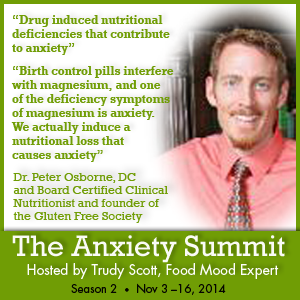Dr. Peter Osborne, DC and Board Certified Clinical Nutritionist was interviewed by host of the Anxiety Summit, Trudy Scott, Food Mood Expert and Nutritionist, author of The Antianxiety Food Solution.
Drug induced nutritional deficiencies that contribute to anxiety
- the victim-warrior concept for being empowered
- what is the meaning of drug-induced nutritional deficiencies
- drugs that contribute to anxiety through nutrition loss
- estrogen/ birth control pill and magnesium, folate, vitamin B6
- antibiotics: good bacteria, B vitamins esp biotin and vitamin B12, vitamin K
- antacids: protein malnourishment
- NSAIDs: iron, vitamin C, folate, strips mucosal layer
- prescription meds in drinking water
- how to test for these nutritional deficiencies
- nutritional deficiencies caused by gluten and the Gluten-Free Society
Here are a few snippets from our interview:
Birth control pills interfere with magnesium, and one of the deficiency symptoms of magnesium is anxiety. We actually induce a nutritional loss that causes anxiety.
I think for women, one of the most common problems is actually the estrogen pill, whether they’re being taken as birth control or whether they’re being taken to help with acne or taken to control cycles or hormones. Some doctors still prescribe birth control pills or estrogen pills for bone loss, so just depending on the reason the woman might be taking it, it’s just very clear – I want to be very clear that it’s estrogen that has this impact and this effect. And before I get into it, I will also say this, because a lot of doctors ask me, “Well, what about bioidentical hormones vs. synthetic hormones?” and there is no research that has studied whether there’s a difference between the two. So I’ll just be clear that what we’re referring to, the research that we’re referring to, largely has to do with prescriptive estrogen-based hormone that is not bioidentical, so I don’t think we have any research that would delineate the difference between the two.
One of the most common nutritional side effects of estrogen prescriptive pills is magnesium loss. Now, magnesium is an extremely important mineral. It plays a role in more than 300 chemical reactions in the human body. Of those 300 chemical reactions, several of them have to do with the proper utilization and the proper metabolism of estrogen. In essence, how do women excrete estrogen so that it doesn’t build up in their system and contribute to different forms of cancer? Well, this is done through a particular enzyme system that magnesium drives or runs, and this same enzyme system – it’s actually called COMT, catechol-O-methyltransferase, which is just a fancy way of talking about this enzyme. This enzyme is – again, it’s magnesium driven. This very same enzyme is extremely important for neurochemical production in the brain and neurochemical production in the gut.
Here is a link to Ross Pelton’s book, Drug-Induced Nutrient Depletion Handbook. This is a book I come back to refer to again and again. In the interview we got the titles a bit mixed up. Drug Induced Nutritional Deficiencies is the title of Daphne Roe’s book.
Here are some links to articles about prescription drugs being present in US drinking water:
- NBC article: 46 million in U.S. have drugs in drinking water
- An article by the non-profit Clean Water Action
- An interview and Q and A on NPR
Dr. Osborne founded Gluten Free Society in 2010 to help educate patients and physicians on the far reaching effects of gluten sensitivity. He is the author of Glutenology, a series of books designed to help educate the world about gluten. His gift is a video series called 7 Highly Effective Habits of the Gluten-Free Warrior
If you are not already registered for the Anxiety Summit you can get live access to the speakers of the day here www.theAnxietySummit.com

Thank you Dr Osborne for this in depth discussion on Leaky gut, leaky brain, gluten intolerances as well as how to check about deficiencies, I found it so informative.
We’re pleased you enjoyed this Debs
Very informative lecture of Dr Osborne at the Anxiety Summit 2. Information about B12 defficiency, low stomach acid HCl levels, pernicious anemia and autoimmunity connection very useful. Question – can chronically elevated levels of B12 be also a sign of B12 absorption defficiency in the body or B12 should be always low (in blood tests) if assimilated poorly? Thank you.
Just adding to question above – from lecture I understood B12 defficiency can go in hand with Homocysteine being high. What if B12 and Homocysteine are both high? Thank you.
Glad you enjoyed this Silvija – I really enjoyed interviewing Dr. Osborne!
I typically use low B12 (below 400) and high MMA/methylmalonic acid and high homocysteine as an indication of a need for B12
There is some research
(http://qjmed.oxfordjournals.org/content/early/2013/02/27/qjmed.hct051)stating that “high serum vitamin B12 is a frequent and underestimated anomaly. Clinically, it can be paradoxically accompanied by signs of deficiency, reflecting a functional deficiency linked to qualitative abnormalities, which are related to defects in tissue uptake and action of vitamin B12.” They also say that “high serum cobalamin predominantly encompasses severe disease entities for which early diagnosis is critical for prognosis. These entities are essentially comprised of solid neoplasms, haematological malignancies and liver and kidney diseases.”
This is not an area I have experience with so I’ll ask Dr. Osborne to come and comment on this. Since he uses Spectracell testing, high B12 may indicate something specific on that test.
Trudy
MTHFR gene mutations can “hide” a B12/Folate deficiency – the body cannot methylate the B12/Folate and so the numbers are most of the time artificially higher. This mutation can also affect the body by not allowing certain medications to work like they should and allow for metals detoxification, etc. It goes on and on, but we are going through this now with mom who most likely has dementia. Hard to get her to work the protocols needed to possibly “reverse” symptoms.